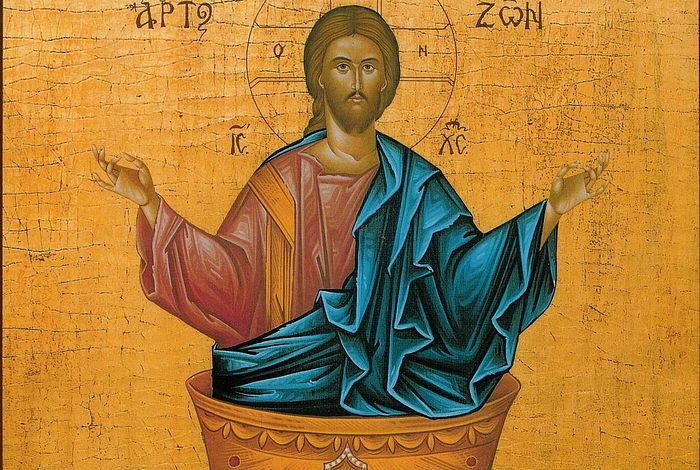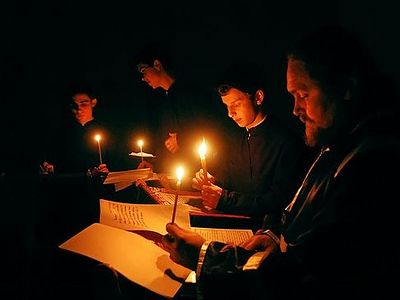Second Homily on the Lenten Season
Contained within the collection of homilies of St. Augustine of Hippo on the liturgical seasons is a series of seven “appropriately solemn” homilies offered at the beginning of the Lenten season in various years. In this series St. Augustine touches upon the classic Lenten themes of fasting, prayers, and almsgiving which enable us as Christians to enter upon the battle against the passions and for the virtues, such as humility and patience, which represent for us the taking up of our own crosses, and which we learn supremely from the Crucified Lord Himself. We offer here one of these sermons each day for the first week of Great Lent:
By the help of the merciful Lord our God, the temptations of the world, the snares of the Devil, the suffering of the world, the enticement of the flesh, the surging waves of troubled times, and all corporal and spiritual adversities are to be overcome by almsgiving, fasting, and prayer. These practices ought to glow throughout the entire life of a Christian, but especially as the Paschal solemnity approaches which stirs up our minds by its yearly return, renewing in them the salutary memory that our Lord, the only-begotten Son of God, showed mercy to us and fasted and prayed for us. As a matter of fact, eleemosyna in Greek signifies “mercy” in Latin. Moreover, what mercy could be greater, so far as we poor wretches are concerned, than that which drew the Creator of the heavens down from heaven, clothed the Maker of the earth with earthly vesture, made Him, who in eternity remains equal to His Father, equal to us in mortality, and imposed on the Lord of the universe the form of a servant, so that He, our Bread, might hunger; that He, our Fulfillment, might thirst; that He, our Strength, might be weakened; that He, our Health, might be injured; that He, our Life, might die? And all this [He did] to satisfy our hunger, to moisten our dryness, to soothe our infirmity, to wipe out our iniquity, to enkindle our charity. What greater mercy could there be than that the Creator be created, the Ruler be served, the Redeemer be sold, the Exalted be humbled, and the Reviver be killed? In regard to almsgiving, we are commanded to give bread to the hungry,[1] but He first gave Himself over to cruel enemies for us so that He might give Himself as food to us when we were hungry. We are commanded to receive the stranger; for our sake He came unto his own and his own received him not.[2] In a word, let our soul bless Him who becomes a propitiation for all its iniquities, who heals all its diseases, who redeems its life from corruption, who crowns it in mercy and pity, who satisfies its desires in blessings.[3] Let us give alms the more generously and the more frequently in proportion as the day draws nearer on which the supreme almsgiving accomplished for us is celebrated. Fasting without mercy is worthless to him who fasts.
Let us fast, humbling our souls as the day draws near on which the Teacher of humility humbled Himself becoming obedient even to death on a cross.[4] Let us imitate His cross, fastening to it our passions subdued by the nails of abstinence. Let us chastise our body, subjecting it to obedience, and, lest we slip into illicit pleasures through our undisciplined flesh, let us in taming it sometimes withdraw licit pleasures. Self-indulgence and drunkenness ought to be shunned on other days; throughout this season, however, even legitimate eating is to be checked. Adultery and fornication must always be abhorred and avoided, but on these days special restraint must be practiced even by married persons. The flesh, which has been accustomed to restraint in regard to its own satisfaction, will readily submit to you when there is question of clinging to another's goods. Of course, care must be taken to avoid merely changing instead of lessening pleasures. For you may observe that certain persons seek out rare liquors in place of their ordinary wine; that they, with much greater relish, counterbalance by the juice of other fruits what they lose by denying themselves the juice of grapes; that, in place of meat, they procure food of manifold variety and appeal; that they store up, as opportune for this season, delights which they would be ashamed to indulge in at other times. In this way, the observance of Lent becomes, not the curbing of old passions, but an opportunity for new pleasures. Take measures in advance, my brethren, with as much diligence as possible, to prevent these attitudes from creeping upon you. Let frugality be joined to fasting. As surfeiting the stomach is to be censured, so stimulants of the appetite must be eliminated. It is not that certain kinds of food are to be detested, but that bodily pleasure is to be checked. Esau was censured, not for having desired a fat calf or plump birds, but for having coveted a dish of pottage.[5] And holy King David repented of having excessively desired water.[6] Hence, not by delicacies obtained with much labor and at great expense, but by the cheaper food found within reach, is the body to be refreshed, or, rather, sustained in its fasting.
During these days of Lent our prayer is lifted up to God, supported by pious almsdeeds and by tempered fasting. With justification one seeks mercy from God when he does not deny it to his fellow man and when the pure intention of the petitioner’s heart is not disturbed by phantom clouds of carnal desires. Let prayer be chaste, lest, perhaps, we crave not what charity but what cupidity seeks; let us not call down any evil upon our enemies; let us not rage passionately in prayer against those whom we cannot harm by actual injury or revenge. Surely, just as we are rendered fit for praying by almsdeeds and fasting, so our prayer itself gives alms when it is directed and poured forth not only for friends but for enemies as well and when it refrains from anger, hatred, and harmful vices. For, if we fast from food, how much more does prayer recoil from poisons? Finally, while we are refreshed by taking food at regular and suitable times, let us never distract our prayer by such feasts. Rather let it endure perpetual fasts because there is a food proper to prayer which it is commanded to take without ceasing. Therefore, let it always fast from hatred and feast upon love.
From The Fathers of the Church vol. 38: St. Augustine: Sermons on the Liturgical Seasons, (New York: Fathers of the Church, Inc.), 1959, pp. 89-92





